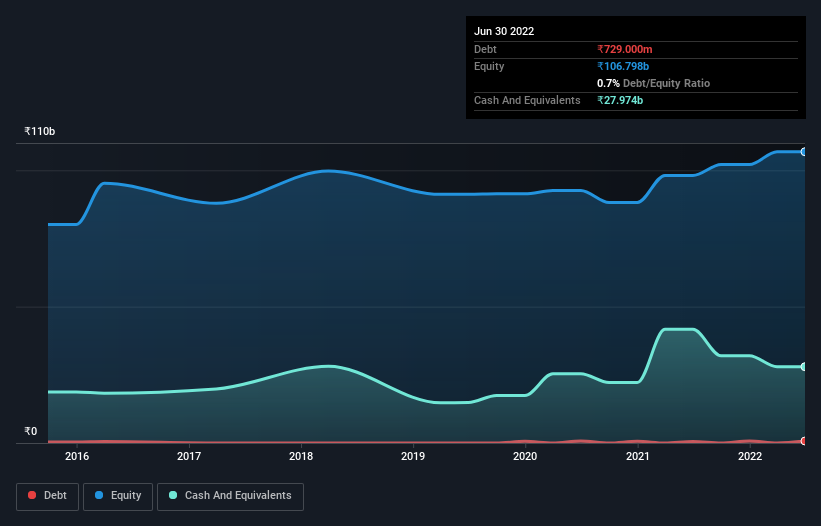
Warren Buffett famously said, 'Volatility is far from synonymous with risk.' It's only natural to consider a company's balance sheet when you examine how risky it is, since debt is often involved when a business collapses. As with many other companies Bosch Limited (NSE:BOSCHLTD) makes use of debt. But is this debt a concern to shareholders?
When Is Debt A Problem?
Debt is a tool to help businesses grow, but if a business is incapable of paying off its lenders, then it exists at their mercy. Part and parcel of capitalism is the process of 'creative destruction' where failed businesses are mercilessly liquidated by their bankers. However, a more common (but still painful) scenario is that it has to raise new equity capital at a low price, thus permanently diluting shareholders. Of course, debt can be an important tool in businesses, particularly capital heavy businesses. When we examine debt levels, we first consider both cash and debt levels, together.
View our latest analysis for Bosch
How Much Debt Does Bosch Carry?
The image below, which you can click on for greater detail, shows that at March 2022 Bosch had debt of ₹729.0m, up from ₹538.0m in one year. But it also has ₹28.0b in cash to offset that, meaning it has ₹27.2b net cash.

A Look At Bosch's Liabilities
Zooming in on the latest balance sheet data, we can see that Bosch had liabilities of ₹43.1b due within 12 months and liabilities of ₹4.17b due beyond that. Offsetting this, it had ₹28.0b in cash and ₹27.0b in receivables that were due within 12 months. So it can boast ₹7.77b more liquid assets than total liabilities.
Having regard to Bosch's size, it seems that its liquid assets are well balanced with its total liabilities. So it's very unlikely that the ₹519.3b company is short on cash, but still worth keeping an eye on the balance sheet. Simply put, the fact that Bosch has more cash than debt is arguably a good indication that it can manage its debt safely.
While Bosch doesn't seem to have gained much on the EBIT line, at least earnings remain stable for now. There's no doubt that we learn most about debt from the balance sheet. But it is Bosch's earnings that will influence how the balance sheet holds up in the future. So when considering debt, it's definitely worth looking at the earnings trend. Click here for an interactive snapshot.
Finally, a company can only pay off debt with cold hard cash, not accounting profits. While Bosch has net cash on its balance sheet, it's still worth taking a look at its ability to convert earnings before interest and tax (EBIT) to free cash flow, to help us understand how quickly it is building (or eroding) that cash balance. In the last three years, Bosch's free cash flow amounted to 28% of its EBIT, less than we'd expect. That's not great, when it comes to paying down debt.
Summing Up
While we empathize with investors who find debt concerning, you should keep in mind that Bosch has net cash of ₹27.2b, as well as more liquid assets than liabilities. So we are not troubled with Bosch's debt use. The balance sheet is clearly the area to focus on when you are analysing debt. However, not all investment risk resides within the balance sheet - far from it. For example Bosch has 2 warning signs (and 1 which doesn't sit too well with us) we think you should know about.
Of course, if you're the type of investor who prefers buying stocks without the burden of debt, then don't hesitate to discover our exclusive list of net cash growth stocks, today.
Valuation is complex, but we're here to simplify it.
Discover if Bosch might be undervalued or overvalued with our detailed analysis, featuring fair value estimates, potential risks, dividends, insider trades, and its financial condition.
Access Free AnalysisHave feedback on this article? Concerned about the content? Get in touch with us directly. Alternatively, email editorial-team (at) simplywallst.com.
This article by Simply Wall St is general in nature. We provide commentary based on historical data and analyst forecasts only using an unbiased methodology and our articles are not intended to be financial advice. It does not constitute a recommendation to buy or sell any stock, and does not take account of your objectives, or your financial situation. We aim to bring you long-term focused analysis driven by fundamental data. Note that our analysis may not factor in the latest price-sensitive company announcements or qualitative material. Simply Wall St has no position in any stocks mentioned.
About NSEI:BOSCHLTD
Bosch
Engages in the manufacture and trading of automotive products in India and internationally.
Flawless balance sheet average dividend payer.


